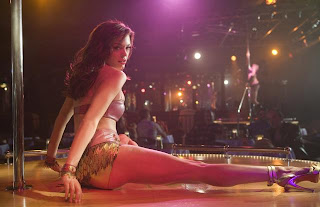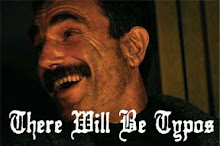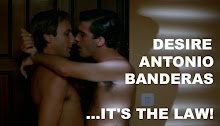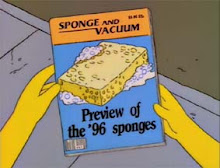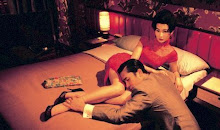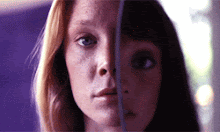
I realize I'm hardly the first person to substantiate Wes Craven's sleaze shocker The Last House on the Left as valid filmmaking. Hell, even Roger Ebert gave it a glowing review upon its release, going so far as to credit the film for its "good ear for dialogue and nuance." Given its notoriety as exploitation trash and an amateur exercise in brutality, it's very easy to overlook the film's undertones.
Since Craven's infamous debut however, his films have been graciously re-evaluated for their sharper points regarding the delineation of class, the breakdown of the family, the perils and pointlessness of violence, and even the loss of innocence, which I'll discuss here. All of that delicious subtext is here in his first film (not counting his early forays in porn directing mind you), and it's all the more surprising given the film's reputation for Z-grade acting (not entirely so!) and bumbling changes in tone. Wes Craven, whether he knew it then or not, was already dabbling in his fascinations and establishing himself as a horror auteur, at least on occasion.
This is a breakdown of The Last House on the Left, or a reading rather, to dissect the artistic merit of one of cinema's most grimy grindhouse classics; focusing on the theme of lost innocence, which I think plays hauntingly and nihilistically here. Mari Collingwood's arc, as well as those of Phyllis and Junior, become a sort of cautionary tale about the bleak desecration of youth, inescapable as it is inevitable...
A "true story" precursor acts as lead-in and contrast to a peaceful, idyllic woodland setting; the environment which is both childhood home to the girls and their final resting place. The woods become a central place for for the action of the film, and for Mari's arc in particular, but the childhood home as we know is about to be forever changed.
* * *
Mari's name is etched onto the Collingwood mailbox next to an arrow-struck heart, not unlike something she might scribble in a yearbook or her diary. It signifies her childlike passions and burgeoning desires. Coincidentally the film begins and centers upon Mari's seventeenth birthday, the cusp at which Mari is no longer considered an adolescent.The local postman, having known Mari for years, remarks, "You'd think she's the only kid to reach the age of seventeen. 'Course she's just about the prettiest piece I've ever seen." This pointed statement places Mari into a sexualized context, now a woman in the eyes of those around her.
 The title card flashes over Mari, nude in the shower. Her point of development and transition is the film's center upon which the ironic and tragic story spins its chaotic pull.
The title card flashes over Mari, nude in the shower. Her point of development and transition is the film's center upon which the ironic and tragic story spins its chaotic pull. Mari is experiencing her first surges of youthful rebellion as well. "Okay, okay, Drill Seargent!" she responds to her mother's badgering. She takes a long glance in the bathroom mirror, as if she might realize something different about herself on this special day. The camera pans past her gaze to an empty wall, accompanied by the lyrics "And the road leads to nowhere." A sinister foreshadowing for sure.
Mari is experiencing her first surges of youthful rebellion as well. "Okay, okay, Drill Seargent!" she responds to her mother's badgering. She takes a long glance in the bathroom mirror, as if she might realize something different about herself on this special day. The camera pans past her gaze to an empty wall, accompanied by the lyrics "And the road leads to nowhere." A sinister foreshadowing for sure. Mari's attending a concert in a bad neighborhood of the big city, to her mother's great concern. She kisses her father on the cheek, calling him "Daddy," but he's vocally distracted by her breasts. He even mentions her need to wear a bra. Well, she's no longer his little girl anymore.
Mari's attending a concert in a bad neighborhood of the big city, to her mother's great concern. She kisses her father on the cheek, calling him "Daddy," but he's vocally distracted by her breasts. He even mentions her need to wear a bra. Well, she's no longer his little girl anymore. "Look young lady, when I was your age..." cringes Mom, offended by Mari's exposed nipples and her taste in a band called Bloodlust. This highlights a growing distance between mother and daughter, a relationship and generational gap. Mari is of "the love generation" reminds Mom, upon hearing that Bloodlust kills live chickens in concert. Mari accepts a peace necklace from them, but could not care less about the harmed chicken. Her priorities have also changed.
"Look young lady, when I was your age..." cringes Mom, offended by Mari's exposed nipples and her taste in a band called Bloodlust. This highlights a growing distance between mother and daughter, a relationship and generational gap. Mari is of "the love generation" reminds Mom, upon hearing that Bloodlust kills live chickens in concert. Mari accepts a peace necklace from them, but could not care less about the harmed chicken. Her priorities have also changed.Much to her mother's dismay, Mari's attending the concert with Phyllis Stone, who's apparently a bad influence. "And from what Nancy Springer tells me, that's not all she does down there," she criticizes. Through cross-cutting we see Phyllis fish a bottle of liquor from the lake in which she's hidden it.
Mari's making it a vocal point to rebel from her mother, as any teenager would. "They're in the iron and steel business... My mother irons and my father steals," jokes Phyllis upon Mom's grueling questioning, to Mari's great pleasure. We cross-cut again to Phyllis and Mari planning to buy grass as Mari continues pointedly making teenage transgressions.
 "Soft, like in a whole bunch of cotton," describes Mari, dreaming of how it what it would be like to "make it" with the band Bloodlust. "Not wild and gory," she adds. She naively idealizes the notion of a sexual encounter, to which Phyllis laughs off, "They're Bloodlust, man! Like they're crazy, you know?!" She imagines her first sexual experiences as something gentle and sweet; a far cry from the experience to unfold.
"Soft, like in a whole bunch of cotton," describes Mari, dreaming of how it what it would be like to "make it" with the band Bloodlust. "Not wild and gory," she adds. She naively idealizes the notion of a sexual encounter, to which Phyllis laughs off, "They're Bloodlust, man! Like they're crazy, you know?!" She imagines her first sexual experiences as something gentle and sweet; a far cry from the experience to unfold. The surrounding nature gains importance here, reflecting the point of transition within the characters. While Mari notes the changes that come with turning seventeen, the leaves around her are changing as well. "I guess winter's coming on," says Phyllis. Mari, enchanted by the surroundings, smiles and ponders, "I've changed this winter... I mean, my breast's filled out. I mean they were nothing last summer... I feel like a woman for the first time in my life." She rises and twirls, joyfully shouting "Rodney Johnson!" Mari's clearly enamored with the prospects of her latest crush.
The surrounding nature gains importance here, reflecting the point of transition within the characters. While Mari notes the changes that come with turning seventeen, the leaves around her are changing as well. "I guess winter's coming on," says Phyllis. Mari, enchanted by the surroundings, smiles and ponders, "I've changed this winter... I mean, my breast's filled out. I mean they were nothing last summer... I feel like a woman for the first time in my life." She rises and twirls, joyfully shouting "Rodney Johnson!" Mari's clearly enamored with the prospects of her latest crush.
 As the two leave for the concert, the same song lyrics again speak a grim omen, "And the road leads to nowhere." It's as if the cruel irony has already been set into place, implying that ultimately these girls will undoubtedly return home, as if it were the only destination.
As the two leave for the concert, the same song lyrics again speak a grim omen, "And the road leads to nowhere." It's as if the cruel irony has already been set into place, implying that ultimately these girls will undoubtedly return home, as if it were the only destination.Immediately upon leaving the girls get their first awareness of the threat via a news report on the car radio: a sadistic rapist/murderer gang has escaped into the city. Mari and Phyllis have left the peaceful childhood home for that very same city, and nothing will look the same when they return.
The first cutaway from the female leads is to a shot of Junior Stillo, another paradigm of waning innocence. Junior is nearly the same age as Mari and Phyllis, but his relationship to his father hardly constitutes the loving "Daddy" figure we've seen for Mari. Krug Stillo is notorious for his rape and murder of a priest and two nuns, among other crimes, and had Junior hooked onto heroine as a child, "to control (his) son's life." His first action on screen is to burst the balloon of a playful young boy on the street while Junior passes by unresponsive. Junior has transitioned into adulthood against his will, occasionally reverting into youthful stupor only to be reprimanded by the brutal Krug.
 Walking around the city, Mari looks disgusted, "It's so dirty. My mother was right." As fate would allow, the worlds immediately collide. Mari and Phyllis encounter Junior while attempting to buy grass. They naively trust Junior, who would seem like any boy their age but with a potential hookup. Mari's mother would die if she knew! Junior has been taught well and manipulates the situation in hopes of getting a fix, and in fear of defying his father. Another transgressive act of youthful rebellion becomes means for the downfall, as if the stars had aligned it to happen just like this.
Walking around the city, Mari looks disgusted, "It's so dirty. My mother was right." As fate would allow, the worlds immediately collide. Mari and Phyllis encounter Junior while attempting to buy grass. They naively trust Junior, who would seem like any boy their age but with a potential hookup. Mari's mother would die if she knew! Junior has been taught well and manipulates the situation in hopes of getting a fix, and in fear of defying his father. Another transgressive act of youthful rebellion becomes means for the downfall, as if the stars had aligned it to happen just like this.The dooming moment, in which Phyllis is forcibly beaten and raped in front of Mari's eyes, cross cuts with Mari's parents setting up for her birthday celebration at home. The moment of grim, unexpected horror, plays opposite an upbeat, festive moment in which we gain a better understanding of Mari's sexuality, youth and innocence being fully stripped away. She's removed from her family, but still very close.


 The peaceful waters of home gradually become turbulent. Nature and the homeland are invaded as Krug and Co. return with Phyllis and Mari, bound and gagged. They plan to violate and torture them on the very grounds upon which they were raised, unbeknownst to them. Incidentally they've arrived mere feet from Mari's home and parents, who are unable to stop that which is somehow cruelly inevitable. The environment known to Mari in her youth would forever be altered by the events to come.
The peaceful waters of home gradually become turbulent. Nature and the homeland are invaded as Krug and Co. return with Phyllis and Mari, bound and gagged. They plan to violate and torture them on the very grounds upon which they were raised, unbeknownst to them. Incidentally they've arrived mere feet from Mari's home and parents, who are unable to stop that which is somehow cruelly inevitable. The environment known to Mari in her youth would forever be altered by the events to come.

 Junior still maintains some innocence in the degrading events, avoiding participation and trying mostly to keep a distance, even shouting " Stop it! Stop it! You're gonna kill someone if you're not careful!"
Junior still maintains some innocence in the degrading events, avoiding participation and trying mostly to keep a distance, even shouting " Stop it! Stop it! You're gonna kill someone if you're not careful!"It seems like the big city offers only sex, drugs and violence, which have now found their way back into the home. Phyllis is forced to urinate on herself or else Mari will be sliced. She's forced to hit Mari, repeatedly, with more force each time. They're simultaneously stripped bare and forced to be kiss and be sexual with one another. The lingering sadism, to which Phyllis remains strong, overcomes Mari. Phyllis tries to comfort her, while a sad serenade plays over them, with the lyrics "Now you're all alone... feeling the world close in on you." Phyllis echoes, "It's just you and me here. Nobody else."

 Mari pleads with Junior to help her escape, sensing an understanding within him. "I'm going to call you Willow, because you shake when the wind blows. Krug's the wind," she cries, even offering him the peace necklace given to her by her parents. Junior can't find a connection to this, never willing to part ways with or defy his father. He's tempted moreso by the promise of getting a fix.
Mari pleads with Junior to help her escape, sensing an understanding within him. "I'm going to call you Willow, because you shake when the wind blows. Krug's the wind," she cries, even offering him the peace necklace given to her by her parents. Junior can't find a connection to this, never willing to part ways with or defy his father. He's tempted moreso by the promise of getting a fix. Krug and Co. catch up with Phyllis after an escape attempt. She winds up at a cemetery that coincidentally has already existed on the property. Police officers pass by on the road only feet away, the cruelest irony yet. There is simply no escape. Phyllis is repeatedly stabbed as she crawls to a nearby tree. She stops next to a discarded dollhouse that's been worn by the elements, which, for all intents and purposes, might have belonged to Mari or Phyllis as children. The striking image, simultaneously combining the home and childhood, rests mere inches away from Phyllis as she is ritualistically stripped of her insides.
Krug and Co. catch up with Phyllis after an escape attempt. She winds up at a cemetery that coincidentally has already existed on the property. Police officers pass by on the road only feet away, the cruelest irony yet. There is simply no escape. Phyllis is repeatedly stabbed as she crawls to a nearby tree. She stops next to a discarded dollhouse that's been worn by the elements, which, for all intents and purposes, might have belonged to Mari or Phyllis as children. The striking image, simultaneously combining the home and childhood, rests mere inches away from Phyllis as she is ritualistically stripped of her insides.
 Mari shakes Junior, "You've got to be a man and do something for once!" Junior remains unwilling to stand up. Krug taunts Mari with information about Phyllis and then brands his name into her chest before sadistically raping her in stark silence. Having imagined sex as something "soft... like in a whole bunch of cotton," Mari's (likely first) sexual experience is cold, savage and emotionless.
Mari shakes Junior, "You've got to be a man and do something for once!" Junior remains unwilling to stand up. Krug taunts Mari with information about Phyllis and then brands his name into her chest before sadistically raping her in stark silence. Having imagined sex as something "soft... like in a whole bunch of cotton," Mari's (likely first) sexual experience is cold, savage and emotionless. Having had her innocence and idealism stripped away, Mari walks dead-eyed into the lake to cleanse herself. The sad songs plays, "Now you're all alone... Looking for someone to show they care." Mari is shot by Krug as she descends into the water, a spiteful act while her back is turned. She submerges into the very same lake she's been coming to her entire life, which is now more peaceful than ever.
Having had her innocence and idealism stripped away, Mari walks dead-eyed into the lake to cleanse herself. The sad songs plays, "Now you're all alone... Looking for someone to show they care." Mari is shot by Krug as she descends into the water, a spiteful act while her back is turned. She submerges into the very same lake she's been coming to her entire life, which is now more peaceful than ever. Junior's first attempt to defy his father, having felt guilt over the deaths, has him placing a gun to Krug. His father harshly taunts him, "Blow your filthy brains out! Blow your brains out!" Junior once again submits to his father, turning the gun and shooting himself in the head. His first (obvious) attempted act of rebellion ultimately leads him to the very same end as Mari.
Junior's first attempt to defy his father, having felt guilt over the deaths, has him placing a gun to Krug. His father harshly taunts him, "Blow your filthy brains out! Blow your brains out!" Junior once again submits to his father, turning the gun and shooting himself in the head. His first (obvious) attempted act of rebellion ultimately leads him to the very same end as Mari. How's that for "honor thy father and mother?" In the end "the roads lead to nowhere and the castle stays the same," and that's what we were told from the very beginning.
How's that for "honor thy father and mother?" In the end "the roads lead to nowhere and the castle stays the same," and that's what we were told from the very beginning.Anyone else curious how they plan to handle to currently-in-production remake?












